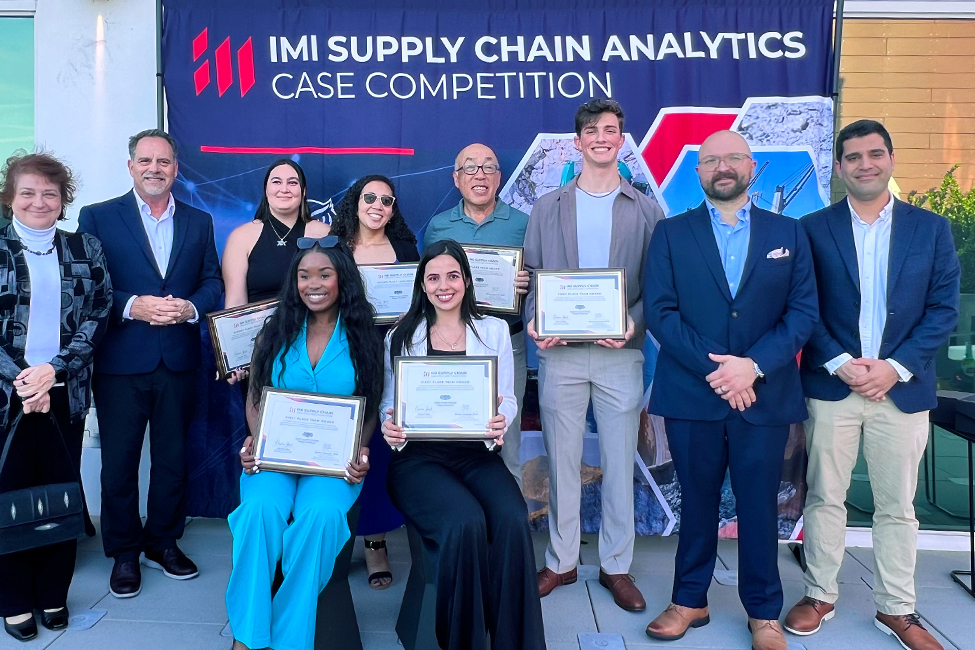FAU Hosts Successful Supply Chain Competition with IMI

A team of undergraduate students won Florida Atlantic University’s inaugural supply chain competition for their innovative solution to a real-life inventory management problem.
A team of undergraduate students won Florida Atlantic University’s inaugural supply chain competition for their innovative solution to a real-life inventory management problem.
The team, comprised of Kurt Schindele, Livia Viera, Kierra Etienne and Bruce Fong, took first place among 18 teams in the Florida Atlantic & International Materials Supply Chain Analytics Case Competition, hosted by the College of Business and the Delray Beach-based company International Materials (IMI). Ashely Rotton and Victoria Cardon came in second place.
“This competition gives students an opportunity to connect theoretical knowledge to practical applications,” said Steven Carnovale, Ph.D., associate professor and director of the masters of science in supply chain management in FAU’s information technology and operations management department. “We are pleased to have partnered with International Materials to provide valuable and practical to our students in the first year of this competition.”
The competition launched in January with each of the teams briefed on a case from IMI to solve. Teams were tasked with figuring out best practices on the quantity and timing of orders at three different location sites, predicting the amount of supplies needed, and creating a visualization tool to help managers with these two issues.
“The talent, dedication, and innovative thinking demonstrated by the participating teams in the competition were truly remarkable. Their commitment and resourcefulness in dealing with an unknown real-life business situation and complex data shone brightly throughout the final presentation. As a company deeply invested in professional excellence and engagement with the local community, we are excited to continue empowering undergraduate students to explore and excel in the dynamic field of supply chain management in partnership with FAU College of Business,” said Marc Dickson, vice president of human resources at IMI.
Supply chain management studies the flow of goods and services to and from a company and includes all the process involved in transforming raw materials and components into final products. FAU launched the Master of Science in Supply Chain Management in the fall of 2021. The degree consists of 10 courses that can be finished in 18 months.
-FAU-
Latest News Desk
- FAU Adds State-of-the-Art MRI System to Advance Research CapabilitiesFAU has added a new state-of-the-art MRI system to its research infrastructure, marking a transformative step forward for groundbreaking studies in neuroscience, clinical health and medical advancements.
- FAU Hosts ABC's 'Sharks' for First-of-its-Kind CompetitionThe judges of ABC's "Shark Tank" will be coming to Florida Atlantic University for its very own CrocTank, the first-of-its-kind live event on Dec. 4 at the Carole and Barry Kaye Performing Arts Auditorium.
- Arslan Munir, Ph.D., Pioneer in Smart Technologies, Joins FAUThe FAU College of Engineering and Computer Science recently welcomed Arslan Munir, Ph.D., an internationally renowned expert, researcher and pioneer in advanced computing and smart technologies.
- VR Could be a Gamechanger in Police-Civilian Crisis EncountersAn FAU College of Social Work and Criminal Justice study immersed police officers in virtual reality training using a realistic mental illness scenario to enhance empathy and complement traditional training.
- STEM Teachers in High-need Schools Resilient Despite ChallengesAn FAU College of Education researcher collaborated on a study examining 30 years of STEM teacher trends, focusing on qualifications and changes in high-need, primarily high-poverty U.S. schools.
- Alcohol-Related Deaths in the U.S. More than Double from 1999 to 2020FAU researchers explored overall trends as well as by age, gender, race and region. The sharpest spike occurred among 25-34-year-olds (nearly fourfold), while individuals aged 55-64 had the highest rates.






